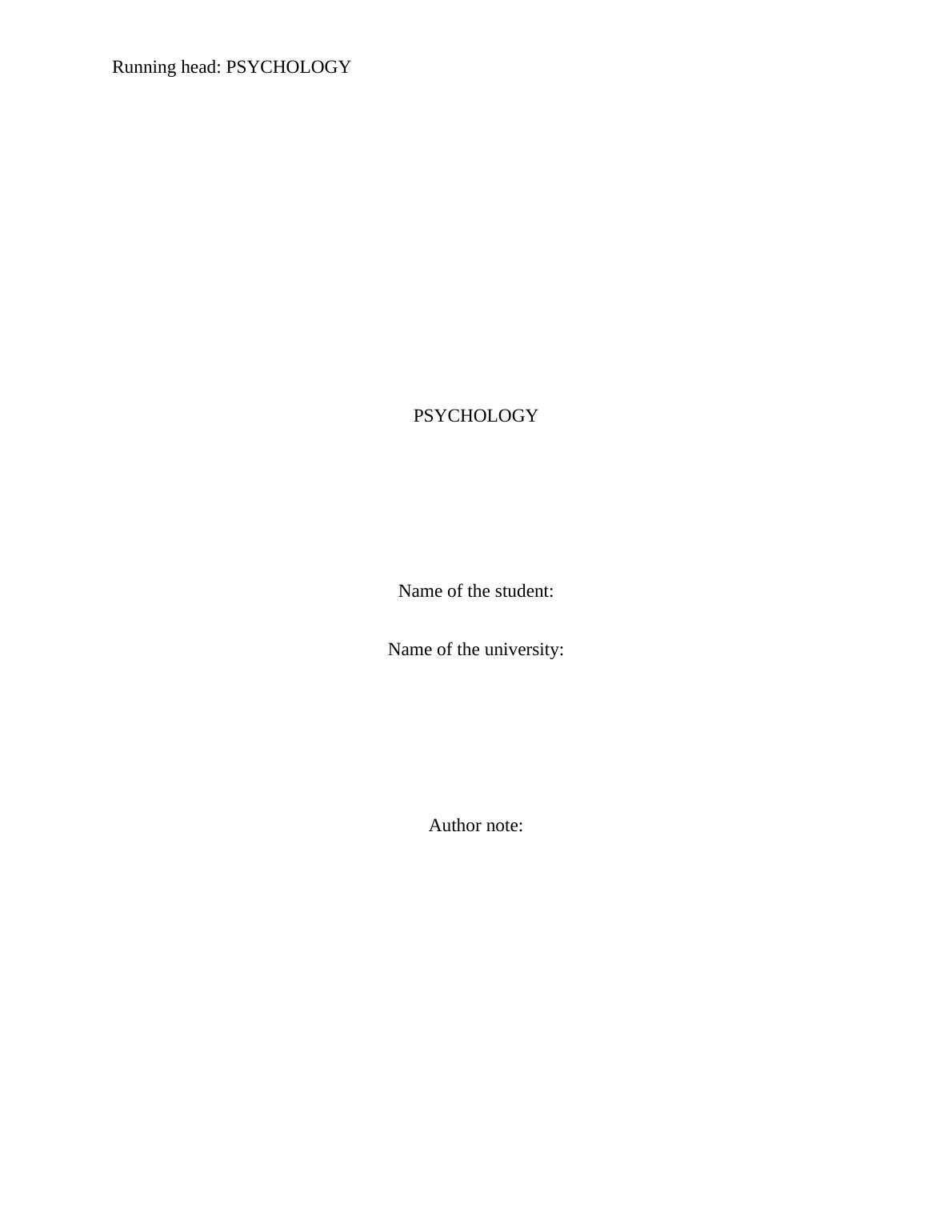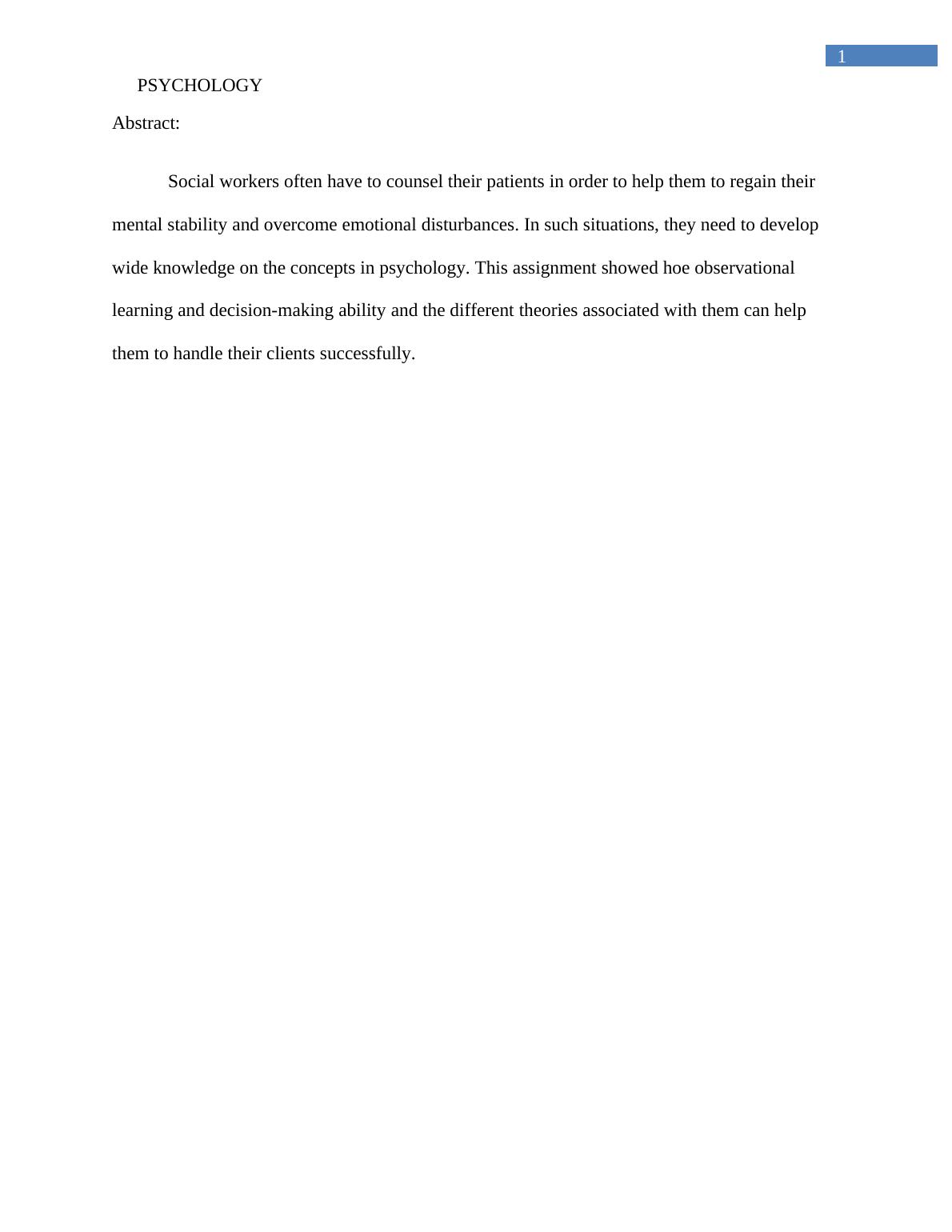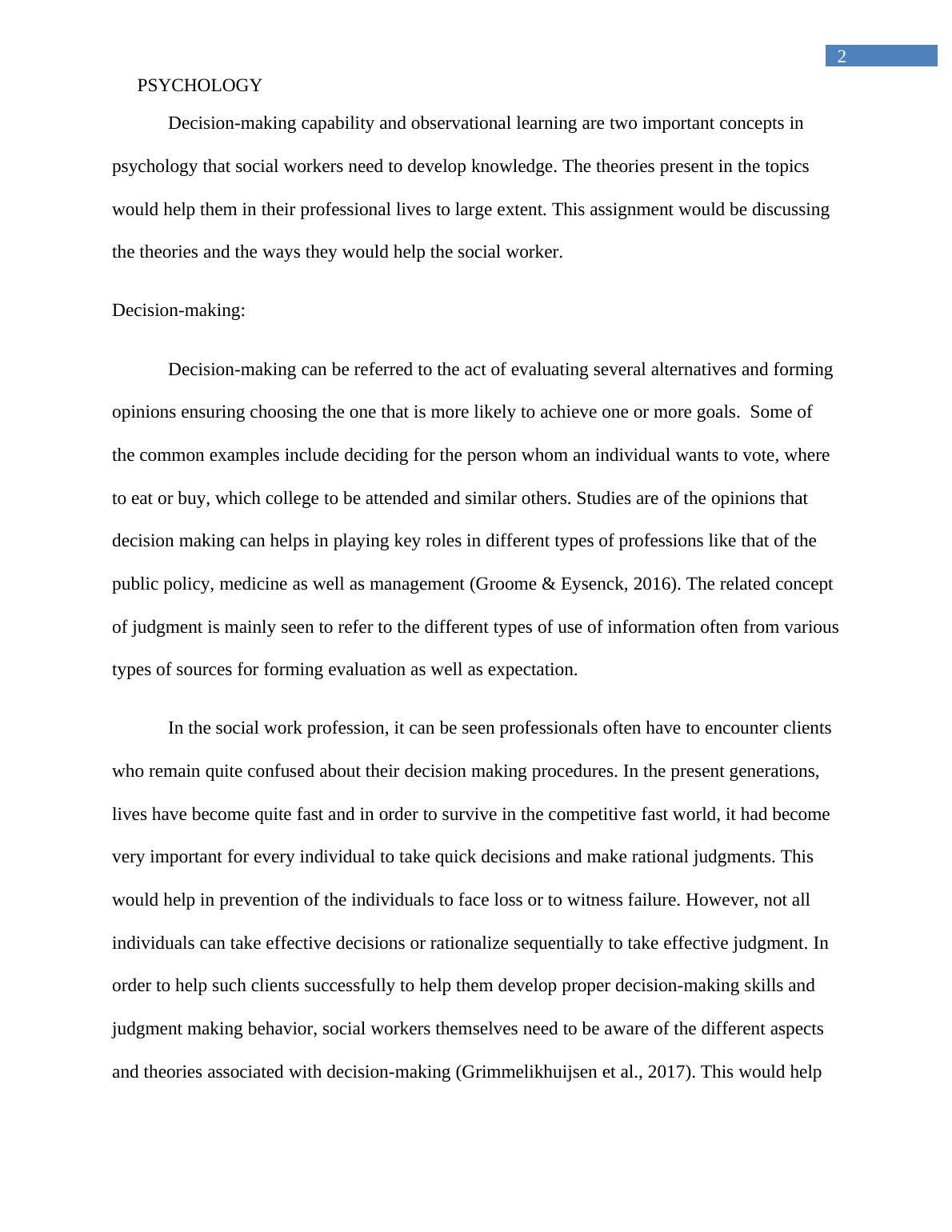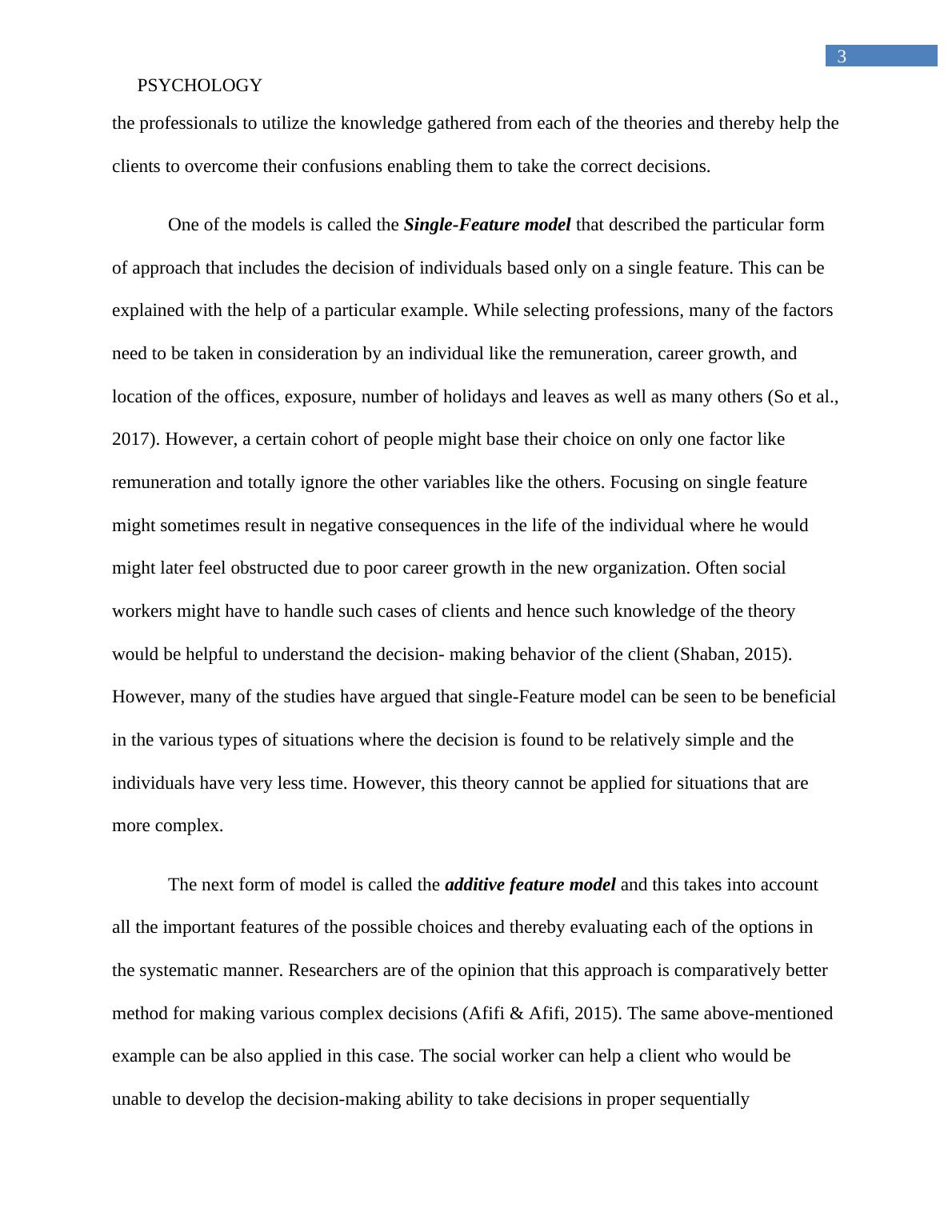Observational Learning and Decision-Making Theories in Psychology
Added on 2023-04-23
11 Pages2625 Words499 Views
Running head: PSYCHOLOGY
PSYCHOLOGY
Name of the student:
Name of the university:
Author note:
PSYCHOLOGY
Name of the student:
Name of the university:
Author note:

1
PSYCHOLOGY
Abstract:
Social workers often have to counsel their patients in order to help them to regain their
mental stability and overcome emotional disturbances. In such situations, they need to develop
wide knowledge on the concepts in psychology. This assignment showed hoe observational
learning and decision-making ability and the different theories associated with them can help
them to handle their clients successfully.
PSYCHOLOGY
Abstract:
Social workers often have to counsel their patients in order to help them to regain their
mental stability and overcome emotional disturbances. In such situations, they need to develop
wide knowledge on the concepts in psychology. This assignment showed hoe observational
learning and decision-making ability and the different theories associated with them can help
them to handle their clients successfully.

2
PSYCHOLOGY
Decision-making capability and observational learning are two important concepts in
psychology that social workers need to develop knowledge. The theories present in the topics
would help them in their professional lives to large extent. This assignment would be discussing
the theories and the ways they would help the social worker.
Decision-making:
Decision-making can be referred to the act of evaluating several alternatives and forming
opinions ensuring choosing the one that is more likely to achieve one or more goals. Some of
the common examples include deciding for the person whom an individual wants to vote, where
to eat or buy, which college to be attended and similar others. Studies are of the opinions that
decision making can helps in playing key roles in different types of professions like that of the
public policy, medicine as well as management (Groome & Eysenck, 2016). The related concept
of judgment is mainly seen to refer to the different types of use of information often from various
types of sources for forming evaluation as well as expectation.
In the social work profession, it can be seen professionals often have to encounter clients
who remain quite confused about their decision making procedures. In the present generations,
lives have become quite fast and in order to survive in the competitive fast world, it had become
very important for every individual to take quick decisions and make rational judgments. This
would help in prevention of the individuals to face loss or to witness failure. However, not all
individuals can take effective decisions or rationalize sequentially to take effective judgment. In
order to help such clients successfully to help them develop proper decision-making skills and
judgment making behavior, social workers themselves need to be aware of the different aspects
and theories associated with decision-making (Grimmelikhuijsen et al., 2017). This would help
PSYCHOLOGY
Decision-making capability and observational learning are two important concepts in
psychology that social workers need to develop knowledge. The theories present in the topics
would help them in their professional lives to large extent. This assignment would be discussing
the theories and the ways they would help the social worker.
Decision-making:
Decision-making can be referred to the act of evaluating several alternatives and forming
opinions ensuring choosing the one that is more likely to achieve one or more goals. Some of
the common examples include deciding for the person whom an individual wants to vote, where
to eat or buy, which college to be attended and similar others. Studies are of the opinions that
decision making can helps in playing key roles in different types of professions like that of the
public policy, medicine as well as management (Groome & Eysenck, 2016). The related concept
of judgment is mainly seen to refer to the different types of use of information often from various
types of sources for forming evaluation as well as expectation.
In the social work profession, it can be seen professionals often have to encounter clients
who remain quite confused about their decision making procedures. In the present generations,
lives have become quite fast and in order to survive in the competitive fast world, it had become
very important for every individual to take quick decisions and make rational judgments. This
would help in prevention of the individuals to face loss or to witness failure. However, not all
individuals can take effective decisions or rationalize sequentially to take effective judgment. In
order to help such clients successfully to help them develop proper decision-making skills and
judgment making behavior, social workers themselves need to be aware of the different aspects
and theories associated with decision-making (Grimmelikhuijsen et al., 2017). This would help

3
PSYCHOLOGY
the professionals to utilize the knowledge gathered from each of the theories and thereby help the
clients to overcome their confusions enabling them to take the correct decisions.
One of the models is called the Single-Feature model that described the particular form
of approach that includes the decision of individuals based only on a single feature. This can be
explained with the help of a particular example. While selecting professions, many of the factors
need to be taken in consideration by an individual like the remuneration, career growth, and
location of the offices, exposure, number of holidays and leaves as well as many others (So et al.,
2017). However, a certain cohort of people might base their choice on only one factor like
remuneration and totally ignore the other variables like the others. Focusing on single feature
might sometimes result in negative consequences in the life of the individual where he would
might later feel obstructed due to poor career growth in the new organization. Often social
workers might have to handle such cases of clients and hence such knowledge of the theory
would be helpful to understand the decision- making behavior of the client (Shaban, 2015).
However, many of the studies have argued that single-Feature model can be seen to be beneficial
in the various types of situations where the decision is found to be relatively simple and the
individuals have very less time. However, this theory cannot be applied for situations that are
more complex.
The next form of model is called the additive feature model and this takes into account
all the important features of the possible choices and thereby evaluating each of the options in
the systematic manner. Researchers are of the opinion that this approach is comparatively better
method for making various complex decisions (Afifi & Afifi, 2015). The same above-mentioned
example can be also applied in this case. The social worker can help a client who would be
unable to develop the decision-making ability to take decisions in proper sequentially
PSYCHOLOGY
the professionals to utilize the knowledge gathered from each of the theories and thereby help the
clients to overcome their confusions enabling them to take the correct decisions.
One of the models is called the Single-Feature model that described the particular form
of approach that includes the decision of individuals based only on a single feature. This can be
explained with the help of a particular example. While selecting professions, many of the factors
need to be taken in consideration by an individual like the remuneration, career growth, and
location of the offices, exposure, number of holidays and leaves as well as many others (So et al.,
2017). However, a certain cohort of people might base their choice on only one factor like
remuneration and totally ignore the other variables like the others. Focusing on single feature
might sometimes result in negative consequences in the life of the individual where he would
might later feel obstructed due to poor career growth in the new organization. Often social
workers might have to handle such cases of clients and hence such knowledge of the theory
would be helpful to understand the decision- making behavior of the client (Shaban, 2015).
However, many of the studies have argued that single-Feature model can be seen to be beneficial
in the various types of situations where the decision is found to be relatively simple and the
individuals have very less time. However, this theory cannot be applied for situations that are
more complex.
The next form of model is called the additive feature model and this takes into account
all the important features of the possible choices and thereby evaluating each of the options in
the systematic manner. Researchers are of the opinion that this approach is comparatively better
method for making various complex decisions (Afifi & Afifi, 2015). The same above-mentioned
example can be also applied in this case. The social worker can help a client who would be
unable to develop the decision-making ability to take decisions in proper sequentially

End of preview
Want to access all the pages? Upload your documents or become a member.
Related Documents
Importance of Reflective Practice in Counselinglg...
|7
|1234
|373
Incentive Salience Theorylg...
|13
|4383
|176
Decision Making Theories for Nursing Professionalslg...
|17
|4889
|398
An Overview of Professional Ethicslg...
|8
|7341
|29
Christian Faith Assignmentlg...
|6
|1642
|37
Reflection on Clinical Decision Making and Judgment Skills in Nursinglg...
|10
|1956
|355